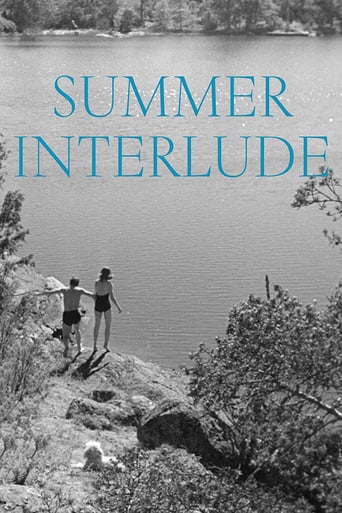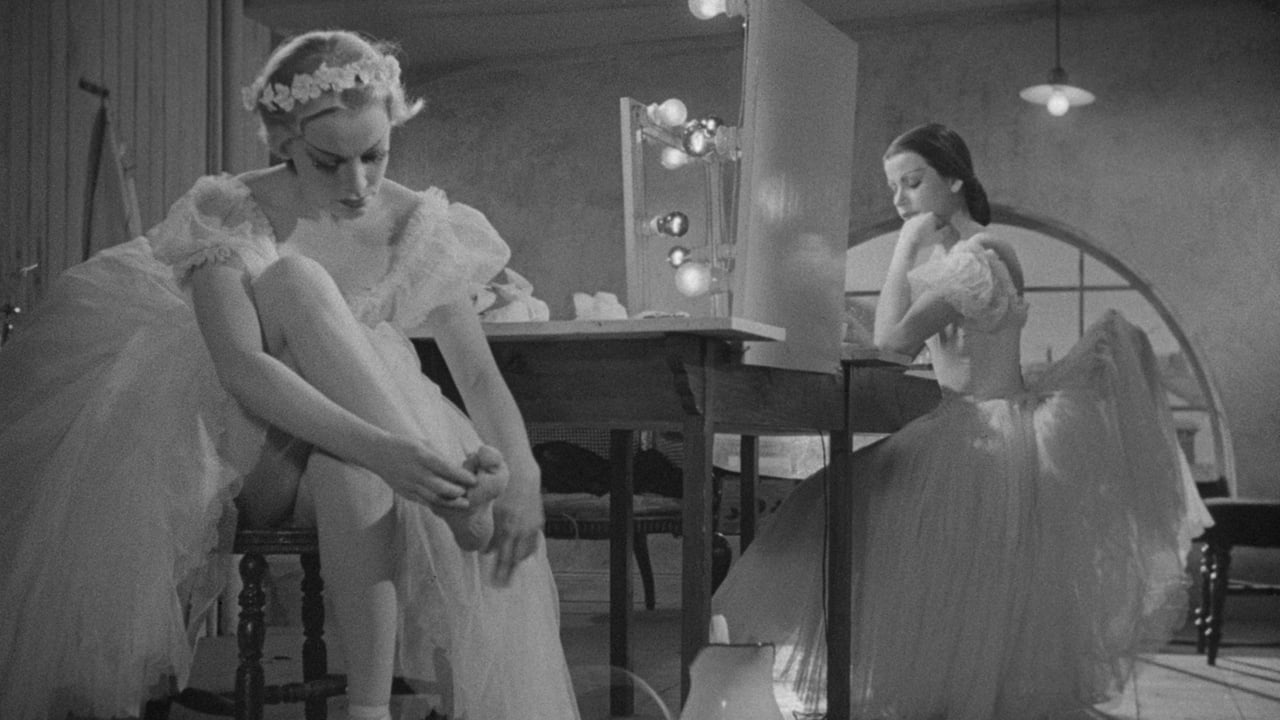gavin6942
While waiting for the night rehearsal of the ballet Swan Lake, the lonely twenty-eight year-old ballerina Marie receives a diary through the mail. She travels by ferry to an island nearby Stockholm, where she recalls her first love Henrik.Bergman later reflected, "For me Summer Interlude is one of my most important films. Even though to an outsider it may seem terribly passé, for me it isn't. This was my first film in which I felt I was functioning independently, with a style of my own, making a film all my own, with a particular appearance of its own, which no one could ape." Indeed, this is a landmark film for Bergman. We see his early use of "summer" as a recurring theme, his stark use of black and white that would define him for a generation... and even the use of "Swan Lake", which may prefigure his love of "Magic Flute" in some way. Bergman brought a visual style to film I have never seen elsewhere and never will. He is the master, and it all begins with "Summer Interlude".
ian-ference
On the face of it, "Summer Interlude" is a fairly straightforward narrative; a ballerina (Marie, masterfully played by Maj-Britt Nilsson) in her late 20s (so in the ballet world, nearing the end of her career) seems detached from the world. She lives with a fairly stolid and boring tabloid journalist (David, in a wonderfully understated performance from Alf Kjellin), but doesn't seem terribly invested in their relationship. On the day of the dress rehearsal before opening night, a package arrives containing a journal - she opens the journal, and suddenly she feels emotion again - as if part of an interior wall is starting to crack. She takes a ferry out to an island where she spent her childhood summers, and flashes back to a summer romance that occurred there in her teenage years - and thus a complex, beautiful, and tragic story begins.This is considered by most - including the Swedish master himself - to be Bergman's first mature film as a director, and with good reason. His previous offerings, while showing glimpses of the promises he would deliver on later in his career, were hampered by his limp, flawed male protagonists. This is the first film in which he explores the female as protagonist, a trope which would continue through most of his career, and it's clear that he has a much better grasp on the female psyche than on the male - with one notable exception ("The Seventh Seal"), his male protagonists often come off as variants of the director himself. Marie is at once strong, uninhibited, and vulnerable as a young woman, and Nilsson plays this role sublimely. As a mature ballerina, she has the appearance of strength that comes from a deadening of the emotions, rather inhibited, and invulnerable - a woman behind a wall she was forced or persuaded to build around herself. Nilsson also takes on this role masterfully, showing the versatility and virtuosity of an actress whose career peaked far too early.The male lead, and Marie's love interest, is Birger Malmsten as Henrik - also wonderfully played as (by this point "yet another") incarnation of young Bergman himself. But unlike the male leads of previous films, Henrik is played with such an earnest innocence and naiveté that we can't help but buy into this wonderful performance. This isn't the director subtly displaying a sense of self-loathing, but rather, baring his soul through his marvelous script and direction. The ancillary roles are all excellent, as can be expected from actors working under Bergman. Stig Olin is particularly fantastic as the master of the ballet company. Kjellin's "regular guy" is believable in both his distance and his frustration, and lascivious "Uncle" Erland (Georg Funkquist) is delightfully seedy and erudite. Gunnar Olsson - the obligatory Bergman priest - is a very minor character, but fits perfectly into the few scenes he appears in. The rest of the supporting cast is fantastic.As one would expect from a Bergman film - especially an early collaboration with his first significant cinematographer, Gunnar Fischer, and frequent editor Oscar Rosander - the visuals are stunning. I won't get over-technical here, but a wonderful mix of slow-fades, natural summer lighting, and exceptional composition make this a visual gem. Working on-location - a rarity for Bergman at this point in his career - he masterfully captures the feel of a short (6-8 week) Swedish summer, from the cuckoo that officially announces the start of summer to the owl that signals its approaching end. The lighting is masterfully achieved; contrast the scene when Marie first bumps into Henrik on the island to that where she walks down the hospital corridor. Every scene - including the outdoor ones, which are far more difficult - are perfectly focused and use exactly the right perspective.Thematically, "Summer Interlude" is almost a crystal ball we can stare into to see the marvelous things the director would do in the future. Love, and its reverse. Life, and its reverse. The questioning of god's existence, relevance, and goodness. This is one of the first Bergman films to significantly use the mirror as a thematic element, in two back-to-back scenes, near the end of the film - this theme would be repeated in many future films, from the shattered mirror in "The Magician" to the dual mirrors in "Cries and Whispers", this would be a leitmotif that Bergman would employ time and time again. There is a chess scene in "Summer Interlude" that would directly evoke that of "The Seventh Seal" had the former not been shot 5 years before the latter. The distance between Marie and David tangibly feels like the silence between the sisters in "The Silence".The overall TL;DR synopsis: This is a beautifully shot, wonderfully acted portrayal of young love that evokes Bergman's recurring themes of love, loss, the distance that necessarily exists between people, the silence of god, self-reflection, and the existentialist notion that we might as well move forward because otherwise, all we do is wait for Godot. The first masterpiece of a director I consider second only to Tarkovsky, and easily in my top 10 of his films - which is saying a lot. A solid 10/10.
lasttimeisaw
This Ingmar Bergman's earlier essay is a dedicative recount of a young ballerina's summer holiday puppy romance with a timid college student which culminated in a tragic accident and the narrative leaps between the reminiscent past and the present (13 years later, when she is preparing her SWAN LAKE premier). The film is slightly differentiated from Bergman's usual philosophy-heavy, mentally- straining members of his reservoir, a summer vacation in a Scandinavian island, with youth in bathing suits, is a curio to find out. But the die-hard Bergman fans will as always revel in the solemn nuances and formidable expressions from Maj-Britt Nilsson's heroine, whose god-spitting manifesto "I'll hate him till the day I die!"defies any compromise and detour, which could also be Bergman's mouthpiece speaking. There are many aesthetically haunting shots with utterly perfect structural deployment (which cannot be a surprise since this is the sixth Bergman's film I have watched so far), a witchcraft of radiating the characters' frank and inherent emotion and sixth senses through Black & White lens, the portrait close-ups, the little cartoon on the letter, even the ballet tableaux, all sparkle with resilience of a human soul's elusive fickleness. The wild strawberry, chess playing with the clergyman and the hag with mustache, there are many anecdotes here just for perusing. Ms. Nilsson captures all the spotlight in the film, although she and Birger Malmsten are quite awkward in pulling off mid-or-late teens in love since wrinkles and creases cannot lie, but it is almost a mission-impossible for any actress since spanning 13 years especially from teenage to adulthood is a great challenge, nevertheless, this blemish can not overthrow the film's majestic study on a psychological case of a lost love soul's selective protection and rejuvenation, although may not be Bergman's best, still a recommendable film from the maestro and furthermore attests his consistency in filmic supremacy.
writers_reign
How simple it must have been back in 1951 to take or leave this film as what it said on the tin, a bittersweet doomed love leaving the survivor full of old regrets, rather than ignoring the story and looking for clues - the chess game with one of the players terminally ill, the wild strawberries, add-your-own referentials - to the famous filmmaker he became rather than the fledgling -this was his tenth film as director - he was here. Long before film came on the scene Literature was cutting its teeth on doomed love and throwing up the odd classic along the way. In film terms we think of Mayerling, Brief Encounter, Ripening Seed, Le Ble en herbe, Le Diable au corps etc, only one of which (Ripening Seed) features teenage love though all are shot through with angst on a spectrum ranging from melancholy to tragedy. Bergman's if fit to be mentioned in the same sentence as those cited whilst being superior to none of them.


 AD
AD


